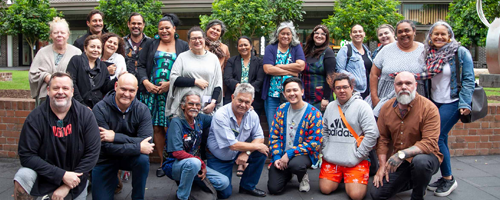This evaluation is an excellent example of a partnership approach to evaluation. The AES wholeheartedly supports both the important topic of the evaluation (healing, building community) and the inclusive indigenous practice, centring of Aboriginal and Torres Strait islander perspectives, priorities, knowledge and ways of being.
Inclusive and culturally responsive practice in the evaluation methods brought together the collective voice of those who have experienced trauma. This work and the evaluation approach has the potential to significantly improve the self determination of indigenous peoples in the network.
About the Indigenous Evaluation Award
This Award recognises Indigenous evaluation practice. This includes evaluations led by Indigenous peoples, and/or conducted in partnership with Indigenous peoples. It also recognises evaluation capacity building with Indigenous peoples in Australia, New Zealand, Papua New Guinea, and Pacifica.
Work nominated for the Award should:
- generate positive impacts for the Indigenous communities
- nurture Indigenous self-determination and sustainability#
- empower Indigenous people in evaluation practice##
- strengthen the accountability of Indigenous evaluation.
Recipients of this Award agree to publish their evaluation products on the AES website.
# The underlying intent of this point is to encourage a conceptual shift in practice from doing evaluations on Indigenous peoples towards doing evaluations with, and/or by, Indigenous peoples. For further guidance on the meaning of Indigenous self-determination and sustainability in this context, please refer to the descriptions in the Australian Institute of Aboriginal and Torres Strait Islander Studies Code of Ethics for Aboriginal and Torres Strait Islander Research – Consultation Draft, 2019. Non-Indigenous and First Nations evaluators can refer to the AES (2021) First Nations Cultural Safety Framework for further guidance on principles and practices for moving towards culturally safe evaluations.
## Empowerment may include work in building evaluation capacity, building a culture of evaluation, and/or an awareness and interest in evaluation, and evaluation policy development. Nominations are assessed by a panel of Indigenous peers.

